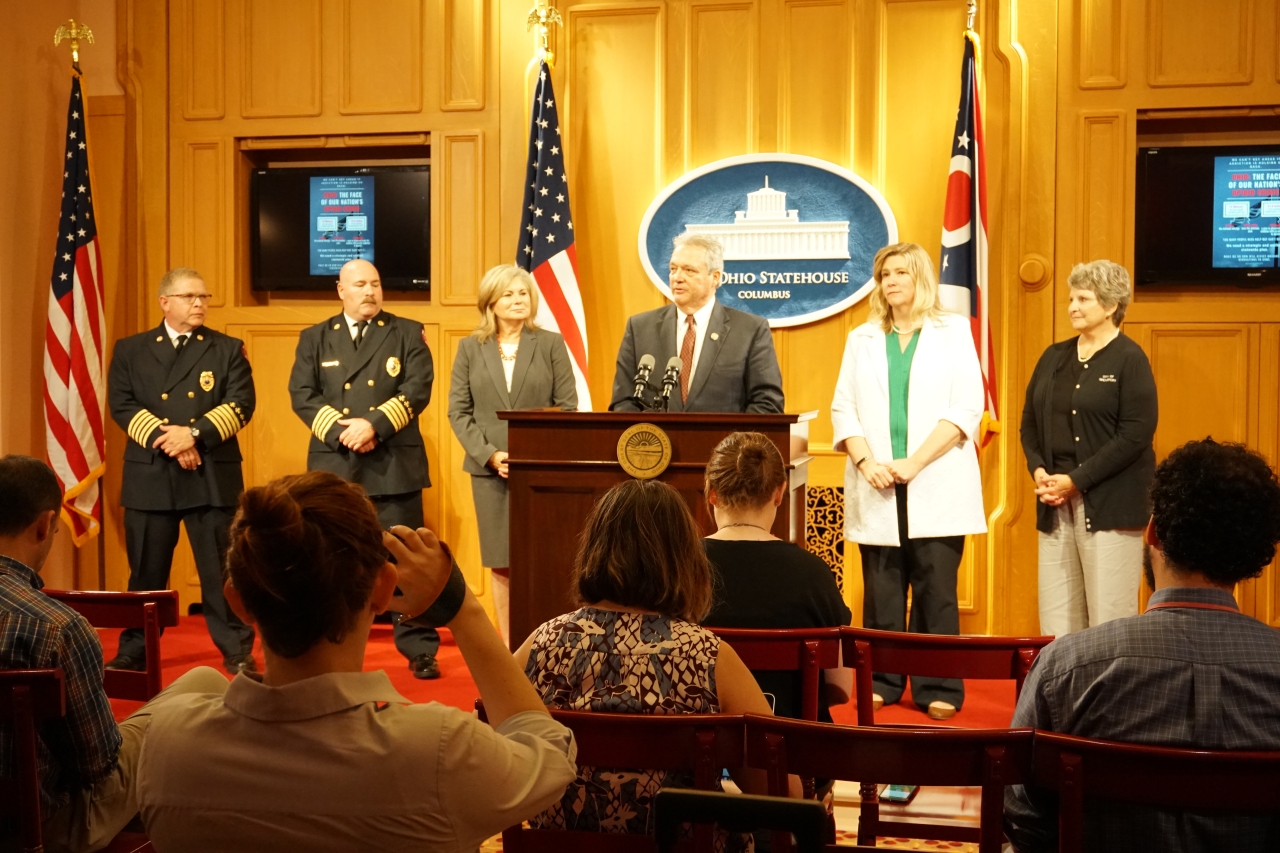As opioid crisis deepens, officials look to create Ohio Office of Drug Policy for unified, strategic statewide plan

As Ohio’s opioid addiction crisis deepens and shows little sign of letting up, state Rep. Richard Brown (D-Canal Winchester) and local officials from Central Ohio and Dayton today announced new legislation to create a unified cabinet-level Office of Drug Policy to serve as a coordinated, comprehensive entity for community officials, law enforcement officers, social workers and local communities to seek out best practices, available grants, state rules, new education programs, and more anti-drug abuse resources.
“We read it in the news. We see it in our neighborhoods. We hear about it at work and at home. And, sadly too many Ohio families are forced to face the grim reality every day that Ohio is the face of the nation’s opioid epidemic,” said Rep. Richard Brown (D-Canal Winchester). “It is clear more can be done to take on this crisis in a strategic and unified way. That’s why I’m proud to introduce this legislation today and look forward to working with members of both political parties who want to ensure addiction no longer holds our state back from living up to our full promise and potential.”
A historic number of Ohioans – 5,232 a year or 14 every day—are dying of unintentional overdose, a 39% spike in the last year. Ohio’s rates are three times the national average. According to a congressional study, Ohio’s current efforts won’t be enough to slow the historic number of deaths from opioids.
“We need more than a piecemeal, ad-hoc approach. What works in Dayton may or may not work in Columbus or Canal Winchester, but we frankly just don’t know without a strategic partnership from the state,” said Nan Whaley, Mayor of Dayton. “A coordinated Office of Drug Policy would offer more hands-on guidance to local communities by serving as the state partner with regional opioid taskforces, counties, cities and community providers.”
The legislation introduced today, modeled after suggestions from the bipartisan Ohio Mayors Alliance, will:
-Coordinate anti-drug efforts from across state and local governments.
-Act as a source of information on innovative new programs communities are adopting and better publishing best practices.
-Help to facilitate cooperation between local governments.
-Seek new sources of funds, through private and public means, for drug prevention and treatment.
-Review existing agency rules to remove barriers to treatment.
-Establish a telephone hotline for community leaders to be able to contact with questions and information.
-Require quarterly public reports of opioid addiction progress and challenges to the General Assembly.
-Require the Governor to appoint a Director of Drug Policy to oversee the new department.
This new office would be in regular contact with local leaders to help share information and resolve issues, unlike the “Opiate Action Team” which offers more generalized data and tips online without the assurance of a quick response. Gov. Kasich’s recent executive order to create an “Opioid Action Team” is only a temporary solution and lacks the long term focus to make cross-coordination a priority, like communities and many local mayors have been asking for.
“It is clear that more needs to be done, and can be done, to help us put best practices in place, draw down on critical resources, and equip first responders and communities with better tools to take on this crisis,” said Kim Maggard, Mayor of Whitehall. “The families that this historic statewide drug emergency is tearing apart cannot afford to wait another day for lifesaving state action.”
Local communities have been doing everything they can to prevent and treat drug abuse, but many are not equipped or adequately funded to fight the opioid crisis alone after losing over $2 billion in state cuts since 2011. Additionally, Ohio has already lost $3.8 billion in economic productivity due to the opioid crisis.
“By creating a central statewide Office of Drug Policy, we can better connect individuals with proven plans to curb drug abuse and prevent overdoses in each and every community,” said Jean Ann Hilbert, Groveport Councilwoman. “I look forward to working with Rep. Brown and my colleagues here today to help pass this potentially lifesaving legislation.”
Supporters of the proposed Office of Drug Policy present at the news conference this morning include Dayton Mayor Nan Whaley, Whitehall Mayor Kim Maggard, Whitehall Fire Chief Preston Moore and Groveport Councilwoman Jean Ann Hilbert.








